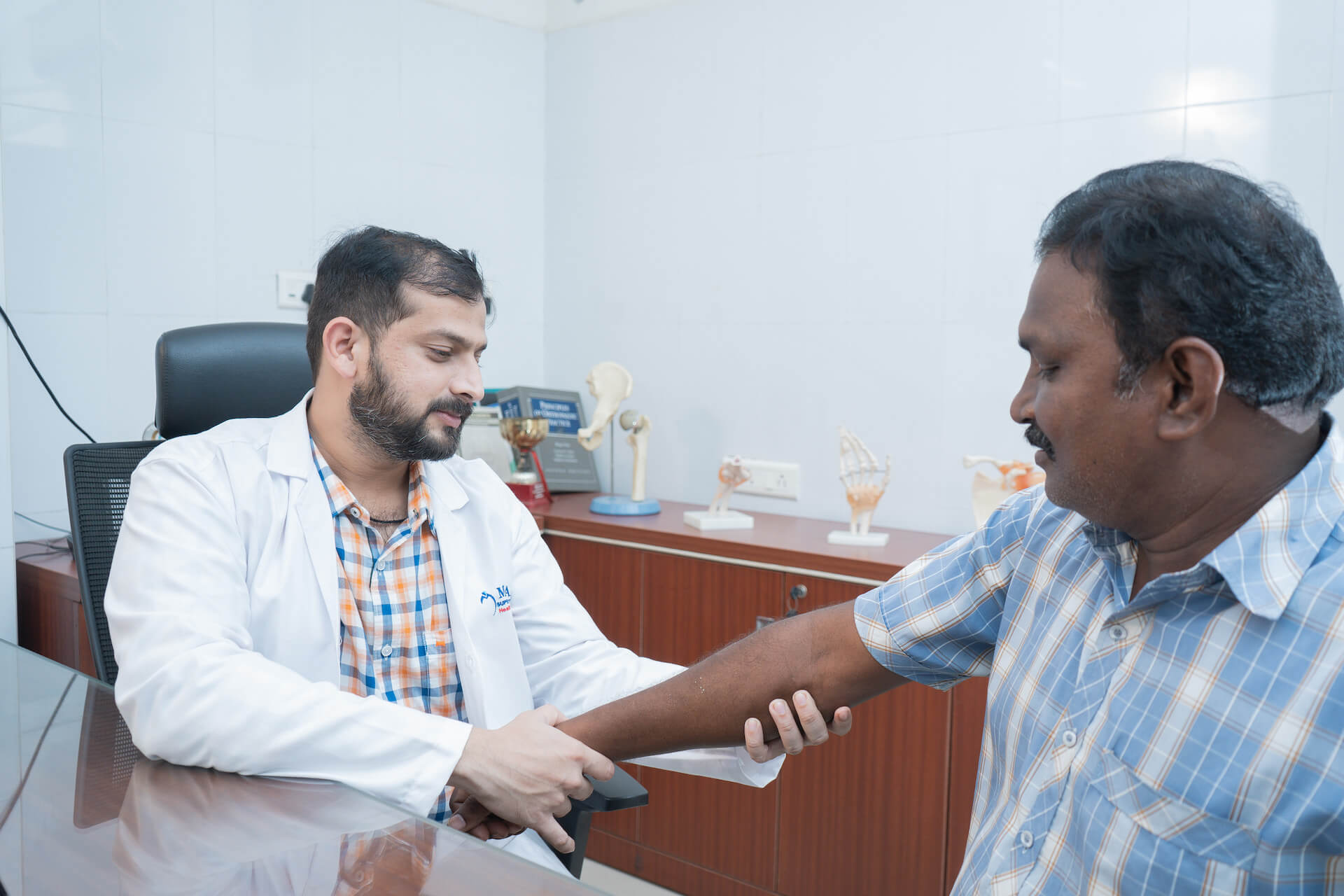MJ Naidu Super Speciality Hospital
- Home
- /
- Arthritis
Arthritis

The Best Orthopedic Hospital for Arthritis in Vijayawada
Understanding Arthritis
What is Arthritis?
Types of Arthritis
Osteoarthritis (OA): OA is the most common form of arthritis and typically occurs due to wear and tear of the joints over time. It primarily affects older adults and is characterized by the breakdown of cartilage, the protective tissue that cushions the ends of bones in a joint. As the cartilage deteriorates, it leads to pain, stiffness, and reduced joint flexibility.
Rheumatoid Arthritis (RA): Unlike OA, RA is an autoimmune disease that can affect people of all ages. Rheumatoid Arthritis is marked by the immune system’s error in targeting the synovium, the membrane that surrounds and protects the joints. This results in inflammation, which can damage the joint cartilage and bone. RA often affects multiple joints simultaneously and can cause systemic symptoms such as fatigue and fever.
Juvenile Arthritis (JA): JA refers to arthritis that develops in children under the age of 16. There are several subtypes of JA, each with its own set of symptoms and complications. Early diagnosis and treatment are crucial in managing JA to prevent long-term joint damage.
Ankylosing Spondylitis (AS): AS is a type of arthritis that primarily affects the spine, causing inflammation in the vertebrae. Over time, this inflammation can lead to the fusion of the spine’s joints, resulting in a stooped posture and reduced mobility.
Psoriatic Arthritis (PsA): PsA is a form of arthritis that often occurs in individuals with the skin condition psoriasis. It can affect the joints, causing pain, swelling, and stiffness. PsA can also lead to nail changes and eye inflammation.
Causes of Arthritis
The exact causes of arthritis can vary depending on the type. However, several common risk factors contribute to the development of arthritis:
Age: Osteoarthritis is more common as people age, as the wear and tear on joints accumulate over time.
Genetics: Some forms of arthritis, such as rheumatoid arthritis and ankylosing spondylitis, have a genetic component, meaning they can run in families.
Autoimmune Factors: Autoimmune diseases like rheumatoid arthritis occur when the immune system mistakenly attacks healthy joint tissues.
Injury: Joint injuries or trauma can increase the risk of developing arthritis in the affected joint.
Obesity: Excess weight can put added stress on joints, particularly in the knees, hips, and spine, increasing the risk of developing osteoarthritis.
Infections: Certain infections can lead to inflammatory forms of arthritis.
Symptoms of Arthritis
The symptoms of arthritis can vary widely depending on the type and severity of the condition. Common symptoms include:
Joint Pain: Continuous discomfort in one or multiple joints is a characteristic feature of arthritis. The discomfort may vary in intensity and can be exacerbated by physical activity.
Stiffness: Arthritis frequently leads to joint stiffness, particularly in the morning or following periods of inactivity.
Swelling: Inflammatory arthritis types can result in joint swelling, warmth, and redness.
Decreased Range of Motion: Arthritis can limit your ability to move a joint through its full range of motion.
Fatigue: Many people with arthritis experience fatigue, which can be related to chronic pain and inflammation.
Weakness: Muscle weakness can occur due to decreased use of the affected joint.
Joint Deformities: In some cases, arthritis can lead to joint deformities, particularly in the fingers and toes.
- 24HRS TRAUMA SERVICE
-
24HRS DIGITAL X-RAY / MRI/CT / USG / X-RAY /
DOPPLER /ECHO - 24HRS LABORATORY
- 24HRS PHARMACY
- 24HRS AMBULANCE SERVICE
- INTENSIVE CARE UNIT
- CASUALTY DEPARTMENT
- FULLY EQUIPPED OPERATION THEATER (2 LAMINAR )
Other Services
Best Quality Service
Personalised Care
Experienced Doctors
Competitive Prices
Diagnosis of Arthritis
Diagnosing arthritis typically involves a combination of medical history, physical examination, and diagnostic tests. These may include:
Physical Examination: Your doctor will examine your joints for signs of inflammation, tenderness, and range of motion.
Imaging: X-rays, MRIs, and ultrasound can help visualize joint damage and assess the severity of arthritis.
Blood Tests: For autoimmune arthritis like rheumatoid arthritis, blood tests can detect specific antibodies and markers.
Joint Aspiration: In some cases, your doctor may aspirate (remove fluid from) a swollen joint to analyze it for signs of inflammation or infection.
Treatment Options for Arthritis
Treatment for arthritis aims to reduce pain, improve joint function, and slow the progression of the disease. The approach to treatment can vary depending on the type of arthritis and its severity. Here are some common treatment options:
Physical Therapy: Physical therapists can design exercise programs to improve joint function and strengthen the muscles surrounding affected joints.
Occupational Therapy: Occupational therapists help individuals learn techniques and use adaptive devices to make daily tasks easier.
Lifestyle Changes: Maintaining a healthy weight, getting regular exercise, and protecting joints from injury can all help manage arthritis symptoms.
Surgery: In severe cases of arthritis, joint replacement surgery (e.g., knee or hip replacement) may be necessary to relieve pain and improve joint function.
Joint Preservation: Joint preservation refers to a set of strategies and techniques aimed at maintaining joint function and reducing the progression of arthritis. It involves a proactive approach to treatment, focusing on strategies to slow or halt joint degeneration, ultimately delaying or even preventing the need for joint replacement surgery.
Alternative Therapies: Some people find relief from arthritis symptoms through methods like acupuncture, dietary supplements, and herbal remedies. However, it’s essential to consult with a healthcare provider before trying alternative treatments.
Living with Arthritis
While arthritis can be a challenging condition, there are many strategies for managing its impact on daily life:
Pain Management: Work closely with your healthcare team to develop a pain management plan that includes medication, physical therapy, and self-care techniques.
Joint Protection: Learn ways to protect your joints during daily activities to prevent further damage.
Stay Active: Regular exercise can help maintain joint flexibility and strengthen the muscles around your joints.
Healthy Diet: A balanced diet can help manage weight and reduce inflammation. Omega-3 fatty acids, found in fish and flaxseed, may have anti-inflammatory properties.
Stress Management: High stress levels can exacerbate arthritis symptoms. You may find relief through relaxation practices, such as meditation and deep breathing.
Support and Education: Joining support groups or seeking education about your specific type of arthritis can provide valuable insights and emotional support.
Preventing Arthritis
While some risk factors for arthritis, such as genetics and aging, cannot be controlled, there are steps you can take to reduce your risk or delay the onset of arthritis:
Maintain a Healthy Weight: Excess weight can put added stress on your joints, particularly the knees, hips, and spine.
Exercise Regularly: Engage in low-impact exercises like swimming, walking, and cycling to keep joints healthy.
Protect Your Joints: Be mindful of joint injuries and take precautions during sports and physical activities.
Ergonomics: Use proper body mechanics and ergonomically designed tools and furniture to reduce joint strain.
Arthritis is a complex group of diseases that can significantly impact the lives of those affected. However, with early diagnosis and a personalized treatment plan, individuals with arthritis can manage their symptoms, improve joint function, and enjoy a higher quality of life.
At MJ Naidu Super Specialty Hospital, we are dedicated to providing compassionate care and innovative treatments to help individuals with arthritis regain their mobility and reduce pain. If you or a loved one is dealing with arthritis, please contact us for a consultation and personalized treatment plan. Together, we can take steps towards a more comfortable and active future.
Remember that early diagnosis and intervention are key to managing arthritis effectively. If you suspect you may have arthritis or are experiencing joint pain, don’t hesitate to seek medical attention and consult with our team of orthopedic specialists.

